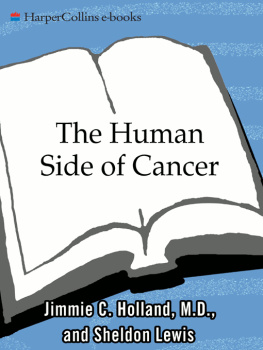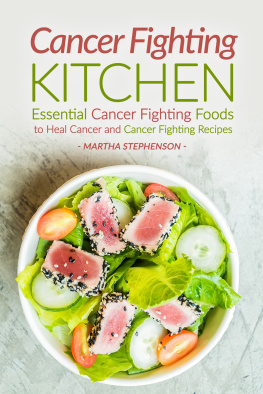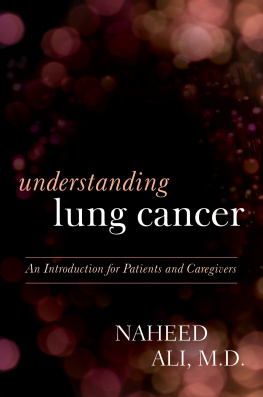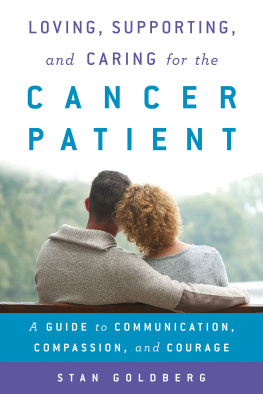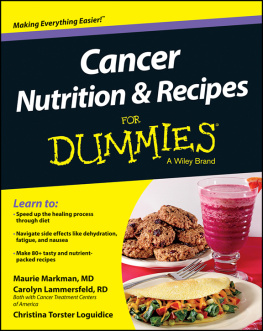Jimmie C. Holland, M.D., and Sheldon Lewis
For my parents, my husband, and my childrenJ.H.
For Sheila, Ezra, and Zachary, and for Ed and Denny LevyS.L.
We are not ourselves when nature, being oppressed, commands the mind to suffer with the body .
Poor little old human beingstheyre jerked into this world without having any idea where they came from or what it is they are supposed to do, or how long they have to do it in. Or where they are gonna wind up after that. But bless their hearts, most of them wake up every morning and keep on trying to make some sense out of it. Why, you cant help but love them, can you? I just wonder why more of them arent as crazy as betsy bugs .
Dr. Holland, I have these three gremlins in my head. One of them is on one side saying, Jack, youre going to lick thisdont worry. Another gremlin is on the other side saying, Jack, you dope, you know you arent going to make it. And in the middle is this third little guy who has to make sense of both of them and help me to keep going on with my life day after day. Sometimes, they get so loud I cant think, but most of the time I keep them locked up, and when Im busy they dont bother me .
T he Human Side of Cancer is an amalgam of thoughts and knowledge from many people. First and foremost are the many patients and their families who shared their experiences with us. Their willingness to express their deepestand sometimes darkestfeelings was remarkable. We were humbled to learn how courageous people were in the face of overwhelming problems. The stories in this book are a composite of our experiences in talking with them, with names and circumstances changed to ensure their privacy. A few patients (who became friends) stand out for special mention: Bob Fisher, who started our patient-to-patient counseling program while he was being treated for leukemia. He insisted that our work had to get out to others. His message: Write the book and forget the sciencejust tell it from the heart. Others include Jay Weinberg, Jack and Rhonda Price, Karen Swymer, and Sheila Kussner. Also, Cornelia Perry stands tall for her insistence, as a teacher of public speaking, that you must get the message out about how important this human side of cancer truly is.
Several people who had been through an experience with cancer agreed to read drafts of the book. Gratitude for their work to ensure credibility goes to: Renata Laqueur, Gene Baranoff, and Arlene Eisenberg. Avis Meehan, director of public affairs at Memorial, reviewed the manuscript and made helpful suggestions.
After we have recognized our debt to the patients, the many colleagues who contributed deserve to be mentioned. Those who work with us at Memorial are central: Marguerite Lederberg, with her consistent, quiet, thoughtful advice; Sarah Auchincloss, who taught us about the sexual issues; Mary Jane Massie, who helped start the program at Memorial; Bill Breitbart and Sherry Schacter, who brought the experience of caring for very ill patients at home; Andy Roth; Reverend Tom McDonnell; Jamie Ostroff; Bruce Rapkin; Reverend George Handzo and the Chaplaincy Service; Jesus Almanza; Mindy Greenstein; Alice Kornblith; Donna J. Wilson; our Spiritual Beliefs Seminar group; the Patients to Patients Volunteers; Karrie Zampini; the groups at the Post-Treatment Resource Center at Memorial; and Elizabeth Peabody and the lung cancer support group. All contributed to different aspects of the book. We also thank the psychiatry department staff, especially Ivelisse Belardo.
The work of many researchers and clinicians around the world is cited; these dedicated investigators have contributed, through their studies and insights, to our present knowledge, on which the book is based. We thank Carole Levine and the United Hospital Fund of New York for allowing us to include information from her study on caregivers.
On a personal level, we thank our families who patiently listened and commented on the book. Without Jim Holland, acting as both a supportive spouse and an objective oncologist, the medical underpinnings of the book would have suffered. Encouragement for the books progress was a part of many conversations with Steven and his wife, Maryland, Mary, Peter and Anne, David, and Diane Holland. Sally Holland and Demece, her partner, read drafts and offered painful but sound criticism.
We are also grateful to Sheila Lewis, who likewise contributed her expertise as an editor and teacher, and to Ezra and Zach. We thank other special friends of this project: Joy Harris, not only a superb literary agent but also a passionate advocate for the human side of cancer, Megan Newman, our editor, for her guidance; Barbara Graham; Ed and Denny Levy; Mark Matousek; Margarita Danielian; and David McMullen.
Finally it was Tony Marchini, our assistant who prepared and organized background materials and provided draft after draft, who made it happen. His unflagging devotion and commitment to the project, his attention to each detail, and his repeated critiquescoupled with confidence in the outcomeensured its successful completion.
I assume that youve picked up this book for the same reasons people come to see me. You may have just found out you have cancer, or you may already be undergoing treatment and feel youve hit a snag. Perhaps you are a survivor wondering whether youre cured or not. Or you are coping with cancer as a chronic disease and feel the need for more support. Maybe you are a fellow traveler on the path, supporting and assisting a loved one with cancer, but feeling the need for help yourself.
Whatever your situation, I wish I could sit with you and talk about whats been going on for you and how youve been coping, and help you find the kind of support thats right for you. Thats the way I would like to do it. But since thats impossible, Ive tried through the chapters of this book to talk with you as I would if you were in my office and we were talking face-to-face about your illness or that of your loved one and about the problems youve had to deal with along the way.
When I see someone for the first time at our counseling center at Memorial Sloan-Kettering Cancer Center in New York, I usually ask a question like this: How have things been going for you since you got sick?
Often the response is: I dont even know where to start.
And I usually say: Well, lets start with your illness. Tell me about whats happened to you.
Then I hear about a cancer journey, starting with finding a lump or having a pain that took the person to the doctor, who diagnosed cancer. Or, for others, its how they were completely surprised by the results of a routine mammogram or colonoscopy or chest X ray that showed cancer. Somewhere along the line, each has heard a version of the words Its cancer.
Some people come to see me at that moment, right after hearing the news, when they are scared, mixed up, and overwhelmed to the point that they cant take the next step. Others come later, after starting their treatment. They hit a bump in the road as they cope with radiation or chemotherapy. A psychological bump might be feeling wired or scared, not being able to sleep or to concentrate on anything, feeling tired and down in the dumps, or being uncertain about the future.
These feelings lead to questions like these: Can I get through this? Is there a light at the end of the tunnel? Will I have done it all for nothing?

